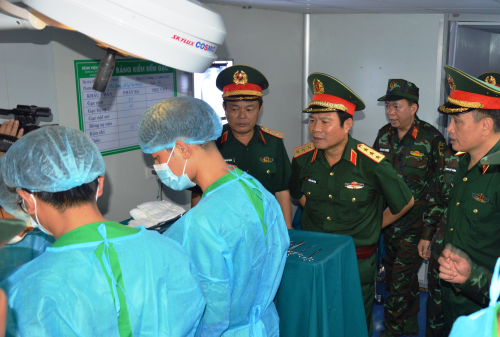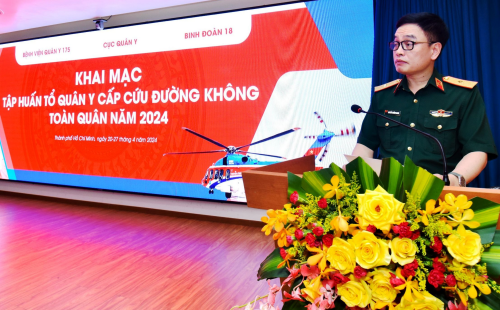Building a strong Military Medical Sector in terms of organisation and expertise to meet its task requirements
Grasping and implementing Resolution 1658-NQ/QUTW dated 20 December 2022 by the Central Military Commission (CMC) on military logistics work towards 2030 and beyond, the Military Medical Sector has been drastically, synchronously taking various measures to make itself strong in terms of organisation and expertise, thereby meeting its task requirements in the new situation.
 |
| Sr. Lt. Gen. Nguyen Tan Cuong, Chief of the General Staff of the Vietnam People’s Army inspecting a field hospital during MT-22 exercise |
Being fully aware of its honour and responsibility for taking care of troop health, providing medical treatment for war invalids and sick soldiers, and participating in the people’s health protection, over the years, the Military Medical Sector has closely cooperated with the Health Sector, localities, ministries, sectors, and relevant units in directing and well performing the assigned tasks. It has developed human resources, consolidated the military medical force at all levels, actively applied modern techniques to medical examination and treatment, and raised the capacity of military medical units, particularly at grass-roots level. Military hospitals, especially at strategic level have achieved comprehensive development with many medical specialties asserting their status in the world and the region, thus obtaining a huge change in the quality of admission, first aid, and treatment. The medical military force within units has strictly maintained regulations on professional activities and well carried out the work of hygiene and epidemic prevention. Troop health has been closely managed and protected right at grass-roots level, with the rate of healthy troops always standing at more than 98.5% across the Military.
In addition to taking care of troop health, the Military Medical Sector has made significant contributions to protecting, improving, and taking care of the people’s health. The military medical force at all levels has actively, proactively carried out the work of integrated civilian and military medicine, provided free medical examination, treatment, and medicine for millions of citizens, and dealt with thorny issues of medical work, especially in remote, isolated, border, sea, and island areas. Besides, the military medical force has always played a vanguard role in epidemic, natural disaster, and catastrophe mitigation. Hundreds of thousands of military medical teams, regardless of dangers, stood shoulder to shoulder with other forces in Covid-19 combat, medical relief, and environmental hygiene management in the areas affected by epidemics and natural disasters. Doing so has greatly contributed to realising the Party and State’s guidelines and policies on protecting, improving, and taking care of the people’s health in the new situation, building a firm “posture of people’s hearts and minds”, and spreading the virtues of “Uncle Ho’s soldiers”.
In the upcoming years, more demanding requirements will be imposed on the tasks of Army building and Fatherland protection; the Military Medical Sector’s tasks will be very arduous and complex. To meet its task requirements, the Sector will continue to improve the quality and effectiveness of performing its functions and assigned tasks, with the building of strong offices and units in terms of organisation and expertise as a central task. To that end, the Sector will focus on several measures as follows.
First, strengthening all-level party committees and commands’ leadership and direction, maintaining close coordination between offices and units, promoting synergy in realising the breakthrough in the Sector’s organisational structure. This measure plays an important role in ensuring a consensus among all cadres, party members, employees, and soldiers of the Sector and raising their responsibility in the process. Party committees and commands of military medical offices, units, and hospitals should continue to grasp resolutions, directives, and guidance by the Party, CMC, and Ministry of National Defence (MND) on force organisation, particularly the CMC’s Resolution 230-NQ/QUTW and Prime Minister’s Decision 1494/QĐ-TTg dated 10 September 2021 on approving the Project to improve the Military Preventive Medicine System’s capacity. In the medium term, the Sector will continue to closely cooperate with relevant offices in reorganising medical treatment facilities across the Military, with a focus on staffing hospitals within military regions and the General Department of Logistics. It will give advice on organising field medical teams and hospitals to respond to states of emergency in peacetime and maintain readiness in the event. Moreover, it will continue to introduce proposals on developing specialised human resources for the military preventive medicine system, with a focus on the Military Preventive Medicine Institute and the Southern Military Preventive Medicine Institute in order to quickly respond to epidemics and significantly contribute to protecting and taking care of health of troops and the people, meeting the requirements of military - defence tasks.
 |
| Director of the Military Medical Department addressing the opening ceremony of the airborne first aid training course of 2024 |
Second, continuing to develop and complete theories about organisational work for military medical support in the new situation, with emphasis placed on newly-founded forces and units moving straight to modernity. In the upcoming time, the Sector will focus on giving advice to competent agencies on synchronously building a system of legal normative documents for the military medical force. At the same time, it will proactively review and design guiding and directing documents as the legal basis for the military medical force’s uniform, regular, scientific implementation. It will actively take part in building legal normative documents relating to the healthcare industry. It will give advice on implementing Project KTS-23, ensuring military medical support for Truong Sa Islands and DK1 Platform, and carrying out medical examination for specialised forces, especially the Navy and the Air Defence - Air Force Service. Besides, it will attach importance to conducting researches on supplementing and adjusting military medical material reserves for combat readiness in a proper way. It will step up integrated military - civilian medical programs to promote the synergy created by the military medical force and the State’s healthcare system in the cause of Fatherland construction and protection under the Government’s Decree 118/2018/NĐ-CP dated 12 September 2018 on integrated military - civilian medical work and Prime Minister’s Decision 658/QĐ-TTg dated 8 June 2023 on approving the National Program on sea, island healthcare development towards 2030.
Third, raising the quality of training and building a contingent of “both red and expert” medical cadres and soldiers. Grounded on the Military’s organisational structure and the Project for medical human resources in the period of 2023 - 2030, with orientation towards 2050 under Decision 869/QĐ-BYT dated 8 April 2024 by the Ministry of Health, the Sector will proactively cooperate with relevant agencies in reviewing and identifying the demand for personnel training to ensure the comprehensiveness, inheritance, and balance of the medical workforce. In this regard, importance will be attached to developing a pool of top experts and skilled technicians capable of mastering modern equipment, while education will be closely combined with specialised training for mobile military medical teams under combat projects. To do so, military medical training institutes, especially the Military Medical Academy and strategic-level military hospitals should actively renew their training and education content, programs, and methods in a basic, practical, effective manner and align training work with medical examination and treatment. Besides, consideration should be given to designing documents on providing first aid for wounded soldiers, organising and deploying Medical Military Team for Disaster Relief, responding to chemical and nuclear and radiation incidents as well as preventing and combating some common epidemics within units.
Fourth, actively mobilising resources for upgrading medical facilities and equipment to bring the quality of professional expertise to a new height. Amid the robust development of science and technology, particularly in the healthcare industry, in order to develop its professional expertise on a par with the region and the world, in the upcoming time, the Sector will continue to review investment programs of hospitals and units; more specifically, it will approve investment programs for medical equipment only when those facilities are sufficiently staffed. Significance will be attached to investing in several key medical fields, such as resuscitation - emergency, poison control, orthopaedics - trauma, infectious disease control, naval medicine, and air force medicine. In the short term, the Sector will focus on completing and bringing into play the projects on acquiring equipment for epidemic prevention and control in the MND’s units, acquiring equipment and modernising the healthcare system within the MND’s hospitals, and building a technology application depot (aka Depot 708). It will give advice on acquiring Telemedicine system for Truong Sa Islands and DK1 Platform and making investments in medical support for naval and air force units. It will carry out researches on manufacturing equipment for sunstroke prevention and control on Truong Sa Islands and DK1 Platform as well as field military medical equipment for both peacetime and wartime. It will actively mobilise resources to develop the military preventive medicine system, particularly at grass-roots level in a modern, compact, mobile manner, while acquiring more medicine and field medical equipment for research centres.
Furthermore, military medical agencies at all levels, particularly the Military Medical Department should issue legal normative documents to improve the effectiveness of direction, guidance, and management, while stepping up digital transformation and administrative reform in military medical work. At the same time, they should enhance the movement titled “Building five-good medical units”, the Determined to Win Emulation Movement, and the Campaign entitled “Military Logistics Sector follows Uncle Ho’s teachings”, with a view to building a strong Military Medical Sector in terms of organisation and expertise, capable of undertaking and successfully fulfilling all assigned tasks, worthy of the trust of the Party, State, Military, and people, meeting the requirements of Fatherland construction and protection in the new situation.
Maj. Gen., Prof., Dr NGUYEN TRUONG GIANG
Director of the Military Medical Department